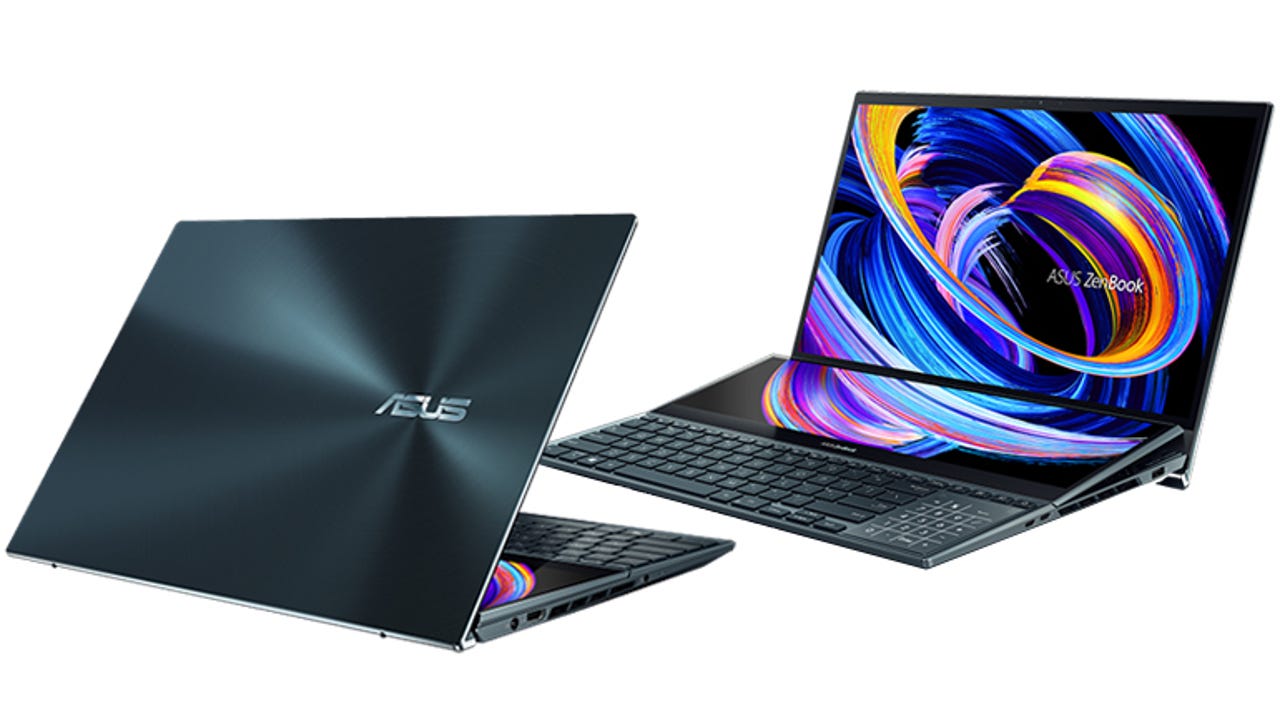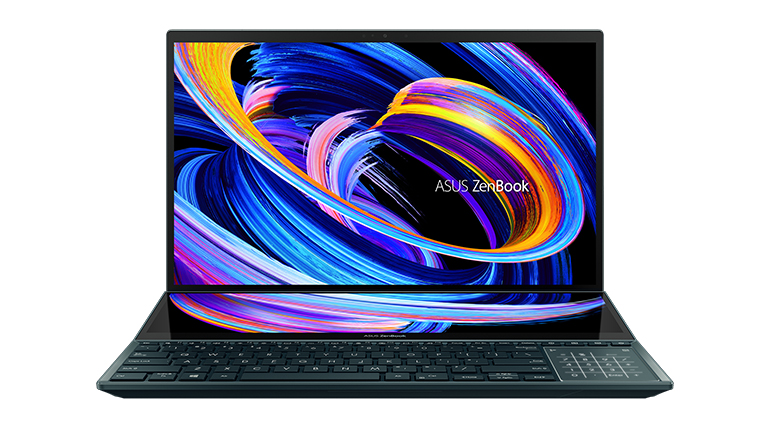
































The ZenBook Pro Duo 15 OLED has a 15.6-inch 4K OLED touch screen and a secondary ScreenPad Plus display that rises up slightly when the laptop is opened.
Images: AsusAsus is well known for its distinctive approach to laptop design, and particularly the idea of second screens. Earlier this year I reviewed the 14-inch ZenBook Duo 14 (UX482), which incorporates a full-width second screen that lifts and tilts up when the laptop is opened. The new ZenBook Pro Duo 15 OLED (UX582L) has the same second screen configuration, in a larger form factor. It's a beast in terms of size and weight, but with an Intel Core i9 processor, discrete Nvidia graphics, a super-bright high-resolution 15.6-inch OLED screen and features designed for creators, could it be a contender, even with a$3,000 price tag?
Few people will want to carry the ZenBook Pro Duo 15 OLED very far, as it weighs 2.34kg (5.16lbs) and measures 35.98cm wide by 24.92cm deep by 2.15cm thick (14.17in. x 9.81in. x 0.85in.). That means it will need a big bag and strong shoulders. The power supply is chunky and will add further weight -- and it may well be needed, given this laptop's disappointing battery life (see below).

The ZenBook Pro Duo 15 OLED is certified to meet MIL-STD 810G and so should cope well with the rough and tumble of a laptop bag. Still, it's nice to get a bundled sleeve, which should prevent bag dust from fouling ports and the plentiful air vents on both sides of the chassis, as well as protecting the deep blue/grey chassis. This Celestial Blue livery will be familiar from any number of other Asus laptops.
The outside of the ZenBook Pro Duo 15 OLED, like its 'Duo' brethren, gives no indication of the radically different screen arrangement inside. Open up and a second screen -- the ScreenPad Plus -- raises itself to sit at an angle designed for easier viewing than if the screen were flat. The ScreenPad Plus occupies more than half of the space normally available to the keyboard and touchpad. I measured its panel at 12.5cm deep (this includes the bezel), while the keyboard section has 10.5cm of depth (including the surround into which it's recessed).
The ScreenPad Plus occupies the full width of the chassis, and is a 14-inch IPS touch screen with 3840-by-1100-pixel resolution. Both the main secondary screens accept input from the bundled stylus as well as finger presses and sweeps. Note the somewhat cramped keyboard and portrait-orientation touchpad.
Image: Sandra Vogel / ZDNetThe keyboard keys are normal in size and offer an acceptable 1.4mm of travel. There's a long row of half-height Fn keys with all the usual suspects, plus a couple that relate to the second screen. The arrow keys are half-height and double-width, and there's a wide but not extra-tall Enter key.
There's a little more resistance than usual on the downward key press, which slowed my typing down slightly, but I found it comfortable enough in short bursts. However, the absence of a wrist rest and the awkward positioning of the touchpad are more serious issues, for me at least.
In terms of the wrist rest, by my measurement the keyboard sits 20mm above desk height. That leaves your wrists hanging in mid-air when typing unless you use a separate wrist rest. Asus does provide one, and if you plan to carry this laptop around you should consider giving it bag-space, although it may not be feasible to use it in cramped conditions such as on trains or airplanes.
Touchpads usually sit below the keyboard in the wrist rest area. As that's not possible here, the touchpad is relocated to the right of the keyboard, and also rotated through 90 degrees, giving it a portrait aspect ratio. This is the same configuration as in the ZenBook Duo 14 (UX482). As with the 14-inch model, the touchpad is actually a third screen, doubling up to provide a number pad that's toggled by pressing an icon in its upper right corner.
At a time when touchpads are getting larger rather than smaller, the portrait orientation feels awkward in use. That said, I can fault neither its responsiveness nor the clarity and brightness of the number pad. If you use an external mouse or other device you'll simply ignore the touchpad, and alternative navigation options are available via the touch sensitive main screen and the ScreenPad Plus.
Asus also provides a stylus that's powered by a single AAAA battery. It's well weighted and comfortable to use, and supports 4,096 pressure levels. It magnetises to the keyboard, but not to either side of the laptop, and there's no within-chassis home for it. As a result, it's quite likely to be mislaid.
Asus offers several dedicated apps for the ScreenPad Plus, including a handwriting recognition tool.
Image: Sandra Vogel / ZDNetThe main screen is a 15.6-inch 4K (3840 x 2160) OLED touch panel with a 16:9 aspect ratio. It sits in fairly large bezels, but the depth of the bottom bezel is obscured by the raised ScreenPad Plus. The upper bezel houses an HD webcam with IR for Windows Hello face authentication. Peak brightness is 550 nits, although this automatically dials down when the system is running on battery power.
As befits a screen aimed at creators, the OLED display is a joy to work with. Video is pin-sharp, with great colour rendering and the 100% DCI-P3 colour gamut showing off to great effect. The display is also Pantone Validated.
The audio subsystem sometimes fails to complement a great display, but that's not the case here. The Harman Kardon speakers deliver strong, punchy sound even at top volume. The DTS equaliser makes a real difference to sound settings, with treble, audio and bass boost as well a more detailed graphic equaliser and preset options for music, movies and games. My only criticism is that I'd like more volume.
SEE:Windows 11 FAQ: Our upgrade guide and everything else you need to know
The ScreenPad Plus is a 14-inch IPS touch panel with 3,840 by 1,100 resolution. It's less vibrant than the main OLED screen, but is clear and sharp enough. Asus assigns several tasks to it.
Users of Adobe Photoshop, Lightroom Classic, Premiere Pro and After Effects can access a full panel of controls, including user-defined presets, leaving the main screen free for the actual creative work. The ScreenPad Plus can also function as a second application screen -- you just drag an item down from the main screen. Social media can scroll, a video window can play, and so on. A Fn key swaps what's on the main screen and the ScreenPad Plus, while the App Navigator tool lets you finger-flick apps between the two screens.
Hit the icon in the top right corner and touchpad becomes a number pad.
Image: Sandra Vogel / ZDNetAsus also offers several dedicated second-screen applications, including a Spotify app, another number pad, Quick Key (tappable shortcuts to frequently-used menu options in applications) and a handwriting recognition tool. It's a modest selection, but perhaps more will become available in due course.
Along with the stylus and wrist rest, Asus bundles an ErgoLift Stand. This is an accessory that can be folded to make a riser for the laptop. The point seems to be to allow the angle of the ScreenPad Plus to be raised further, while you tilt the main screen back to the desired angle. This almost seems like an admission from Asus that the ScreenPad Plus doesn't raise up far enough to allow for comfortable use.
The general specifications of the Asus ZenBook Pro Duo 15 OLED are impressive, although my
 Tags quentes :
Tecnologia
Nosso processo
Computação
Laptops
Tags quentes :
Tecnologia
Nosso processo
Computação
Laptops